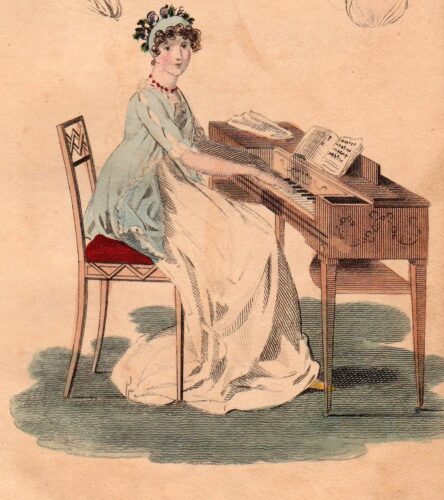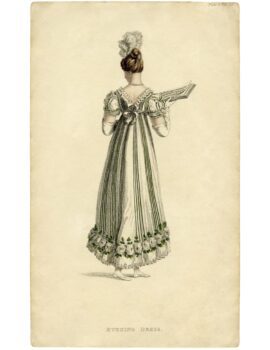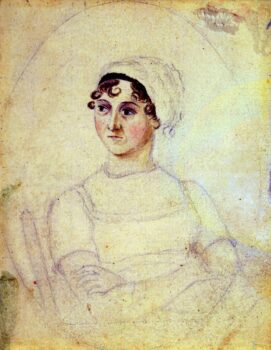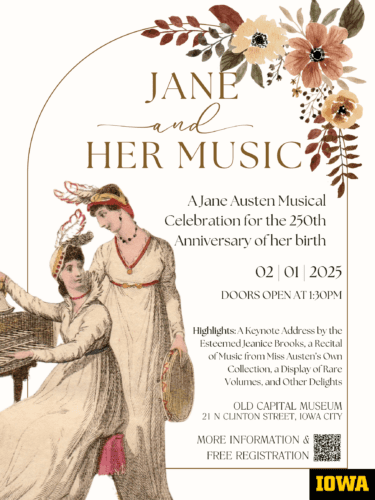
Marian Wilson Kimber
It is a truth universally acknowledged that almost two and a half centuries after her birth, Miss Jane Austen is everywhere. The popularity of the British author’s six mature novels is in no danger of abating. Austen is highly sought after by screenwriters, who have used her plots for blockbuster films without paying her any royalties. Fans argue over the best version of Pride and Prejudice, featuring the iconic Mr. Darcy—is it the 1995 BBC television series with wet-shirted Colin Firth or the 2005 film with Matthew Macfayden emerging from early morning mist? Austen’s books have been reworked as Bollywood-style films, zombie horror, and YouTube vlogs. Even beyond movies and fan fiction, the novelist’s influence is inescapable, from cookbooks to self-help guides, board games to mystery novels. She’s a noted contributor to tomes on etiquette, dating, and marriage—you can purchase a t-shirt that reads, “What would Jane do?” When your efforts at courtship meet with success, you can supply the heirs to your estate with “Little Miss Austen” board books during their toddler years.
The two-hundred and fiftieth birthday of Jane Austen in 2025 certainly calls for celebration, and Iowa City, well known for its literary inclinations, will happily oblige. It may come as a surprise to readers that the day-long event to be held in honor of Austen on Saturday, February 1, will be primarily musical in nature. Hosted by students and faculty of the School of Music of the University of Iowa, “Jane and Her Music” will provide a unique window into Austen and her times. Starting in the afternoon, festivities will take place in the historic Senate Chamber of the Old Capitol, evoking the sort of space where Austen herself might have attended a concert. The day will feature a keynote lecture, a display of rare eighteenth-century publications, and musical entertainment. “Jane and Her Music” will conclude with a gala evening concert, preceded with an informative talk about its music and followed by a delightful tea reception.
Most of Austen’s heroines play the piano, so it is appropriate that her birthday party is a musical event. In Austen’s novels, heroines’ relationships with music reveal much about their characters. Women of the Regency era often played piano or harp and sang, providing entertainment in their homes. Their musical accomplishments could help them in their necessary pursuit of matrimony. Yet too much involvement with music was considered to be in poor taste. For example, in Sense and Sensibility, Marianne Dashwood’s self-indulgent music-making is part of her overly emotional behavior. The inappropriate pianoforte performance by Mary Bennet at the Netherfield ball in Pride and Prejudice has to be stopped before it subjects her family to any further embarrassment. Yet for Austen, music itself isn’t a bad thing, only an unhealthy excess of it. The mysterious gift of an excellent Broadwood piano to Jane Fairfax figures heavily in the plot of the novel, Emma. Although Emma Woodhouse doesn’t practice enough, Jane’s fine pianistic skills are widely admired. So are Elizabeth Bennet’s lesser skills, because she has the sensitivity not to play too long and bore her listeners.
Less well known than the role of music in Austen’s novels, is that the author herself was musical. Her niece recalled that “Aunt Jane began her day with music” and practiced the piano regularly before breakfast. Not only was she a pianist, Austen also sang with a “sweet” voice. Surprisingly, more of Austen’s music collection has survived than any other of her personal artifacts. Compared to many authors Austen left little behind other than her literary legacy. The daughter of a parson, she spent the final years of her adulthood living with her widowed mother and unmarried sister. The income from her novels was not enough to support her. Her financial status meant that her remaining personal belongings were not substantial and only included a ring, a cross, a muslin shawl, and her writing desk. Because Austen was a writer, you would think that all of her correspondence would have been preserved. However, like many relatives of famous persons, Jane’s sister Cassandra destroyed some of her letters, limiting our knowledge of her biography. We aren’t even entirely sure what Austen looked like. There are two rough sketches of her by her sister, one from behind and another in which Jane seems decidedly grumpy. Thus, it is remarkable that numerous bound books of music scores owned by Austen and the other women in her family are held by the Jane Austen House Museum, her home on the Chawton House estate. In all, the Austen family owned nearly six hundred musical works. Since music was expensive, Austen copied out the songs and piano pieces she liked best in manuscript for her personal use.


Attendees at Austen’s 250th birthday party will have the unusual opportunity of immersing themselves in her musical life through hearing the songs that she loved and played herself. Our mini-Austen festival developed out of a course I have taught to graduate students in the School of Music for many years: “Music in the World of Jane Austen.” Designing the course was not exactly a challenge for me. As a confessed “Janeite,” I’ve read and re-read all of Austen’s novels, have seen the movie adaptations, and own a plastic Austen action figure. I even have the voice of Mr. Darcy greeting callers on my cell phone. I adopted the Austen family’s music books as the course’s “textbook” so that class members could learn about typical music making in Regency England. Students have also used the remarkable materials from the Arthur and Miriam Canter Rare Book Room of the Rita Benton Music Library, which owns numerous eighteenth-century scores similar to those the writer might have played. Many Hawkeye Jane fans have enjoyed getting to know Austen’s favorite music. Other students, who simply signed up for a music history credit, have found themselves charmed by what they heard, and the course has resulted in concerts, recordings, a prize-winning paper, and even a dissertation.
“Jane and Her Music” will welcome Jeanice Brooks of the University of Southampton, who assisted in the digitization of Austen’s music books, as the day’s keynote speaker. Prof. Brooks’s talk is entitled “Jane Austen, Home and Away,” and she will speak about how music stimulated Austen’s literary imagination, shaped her persona as author, and allowed her to explore lands near and far through music making at home. The University of Iowa Libraries, including the Rita Benton Music Library, will display some of their rare eighteenth-century books and music. One set of violin sonatas in the Music Library’s renowned Ignaz Pleyel holdings has the name “Miss Austen” on its cover and may have been owned by Jane or another member of her family. Audiences will get to hear as well as see some of the volume’s music performed by violinist Rachel Peters. The day’s music will feature several singers who are “alums” of the Austen music class: Katelyn Peterson, Sarah Hachtman, and Benjamin Laur, as well as Nathan Brown. Pianist Halie Augustus and others will accompany, and Prof. Réne Lecuona will be a piano soloist.
While there will be some familiar selections from beloved film adaptations, most of the day’s musical portions will focus on music from Austen’s own books, including many songs that she copied herself. One might expect to find famous composers of the period, such as Wolfgang Amadeus Mozart or that radical Viennese fellow, Ludwig van Beethoven, in her collection. One of the “great hits” of the eighteenth century, the lovely “Che farò senza Euridice,” from Christoph Willibald Gluck’s opera, Orfeo ed Euridice, will be sung at the concert. However, most of the music that Austen preferred is not familiar to us now. The author was a devotee of the theater, so many of the songs she owned came from dramatic productions. Listeners will hear entertaining music by the British theater composers Samuel Arnold, Charles Dibdin, Henry Harington, and others. Popular songs such as “The Irishman” reflect Austen’s satirical, humorous side. Not to ignore the literary for the musical, the concert will also present the only music specifically mentioned in Austen’s novels, a song and piano repertoire performed by Emma’s Jane Fairfax. The evening will conclude with a rousing version of a period favorite, “The Battle of Prague,” a piece owned by both Jane and her sister-in-law that depicts an actual battle. Jane Austen’s music collection is full of music that is lovely, charming, elegant, and humorous—just like her novels. “Jane and Her Music” is a special opportunity to celebrate her legacy and to step into a forgotten musical world.
Schedule of Events:
- 1:30 pm: Check-in
- 2:00 pm: Welcome/Opening Remarks
- 2:15 pm: “Jane Austen, Home and Away,” keynote speaker: Jeanice Brooks, Professor of Music, University of Southampton
- 3:15 pm: Break
- 3:30 pm: Rare Book and Music Display, Katie Buehner, Librarian, Rita Benton Music Library
- 4:15 pm: “Austen Adaptations” mini lecture-recital: Sarah Hachtman, DMA Voice Performance Student, University of Iowa
- 5:00 pm: Break for Dinner
- 6:30 pm: “Jane Austen’s Playlist,” pre-concert lecture: Marian Wilson Kimber, Professor of Musicology, University of Iowa
- 7:30 pm: Recital featuring songs and violin and keyboard works from the Austen Family’s Music Books. Followed by a tea reception.

Marian Wilson Kimber is Professor of Musicology at the University of Iowa.
Admission to “Jane and Her Music” is free, but registration is required. Doors open at 1:30 pm.
This event is generously sponsored by the University of Iowa’s School of Music, Department of English, Obermann Center for Advanced Studies, College of Liberal Arts and Sciences, International Programs & the Stanley-UI Foundation Support Organization, Rita Benton Music Library, and Ann Rhodes.
Individuals with disabilities are encouraged to attend all University of Iowa-sponsored events. If you are a person with a disability who requires reasonable accommodation in order to participate in this program, please contact Marian Wilson Kimber in advance at m-wilson-kimber@uiowa.edu.
